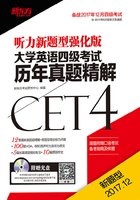
Part II Listening Comprehension (25 minutes)
Section A
Directions:In this section, you will hear three news reports.At the end of each news report, you will hear two or three questions.Both the news report and the questions will be spoken only once.After you hear a question, you must choose the best answer from the four choices marked A),B),C) and D).Then mark the corresponding letter on Answer Sheet 1 with a single line through the centre.
Questions 1 and 2 are based on the news report you have just heard.
1.A)Zuckerberg wrote a letter to his new-born baby girl.
B)Zuckerberg wants his baby girl to grow up in a better world.
C)Zuckerberg became one of the most searched names on Google.
D)Zuckerberg decided to donate most of his Facebook shares.
2.A) About $45 million.
B) About $50 million.
C) About $45 billion.
D) About $99 billion.
Questions 3 and 4 are based on the news report you have just heard.
3.A)It was approved on Sunday.
B)It runs to 42 pages.
C)It targets rich countries tackling climate change.
D)It has a clear vision to go renewable energy.
4.A)In Denmark.
B)In Greenland.
C)In Durban.
D)In the Place de la Pantheon.
Questions 5 to 7 are based on the news report you have just heard.
5.A)The ruling party candidate.
B)The chosen successor of Argentina's president.
C)The governor of Buenos Aires province.
D)The mayor of Buenos Aires.
6.A)Tighten trade restrictions.
B)Lift some financial controls.
C)Carry out social welfare programs.
D)Seek the help of economic reform.
7.A)A candidate with over 45 percent of the vote could win the presidency.
B)A candidate who has 10 more points over the second wins the presidency.
C)Any candidate who wins the most of the vote could be the winner.
D)Any candidate who wins at least 40 percent of the vote gets elected.
Section B
Directions:In this section, you will hear two long conversations.At the end of each conversation, you will hear four questions.Both the conversation and the questions will be spoken only once.After you hear a question, you must choose the best answer from the four choices marked A),B),C) and D).Then mark the corresponding letter on Answer Sheet 1 with a single line through the centre.
Questions 8 to 11 are based on the conversation you have just heard.
8.A)It is more difficult to learn than English.
B)It is used by more people than English.
C)It will be as commonly used as English.
D)It will eventually become a world language.
9.A)Its loan words from many languages.
B)Its popularity with the common people.
C)The influence of the British Empire.
D)The effect of the Industrial Revolution.
10.A)It includes a lot of words from other languages.
B)It has a growing number of newly coined words.
C)It can be easily picked up by overseas travellers.
D)It is the largest among all languages in the world.
11.A)It has many international words.
B)It can be pronounced easily.
C)Its grammar is very simple.
D)It has no different dialects.
Questions 12 to 15 are based on the conversation you have just heard.
12.A)To return some goods.
B)To apply for a job.
C)To place an order.
D)To make a complaint.
13.A)He has become somewhat impatient with the woman.
B)He is not familiar with the exact details of the goods.
C)He has not worked in the sales department for long.
D)He works on a part-time basis for the company.
14.A)It is not his responsibility.
B)It will be free for large orders.
C)It costs £15 more for express delivery.
D)It depends on a number of factors.
15.A)Report the information to her superior.
B)Pay a visit to the saleswoman in charge.
C)Ring back when she comes to a decision.
D)Make inquiries with some other companies.
Section C
Directions:In this section, you will hear 3 short passages.At the end of each passage, you will hear three or four questions.Both the passage and the questions will be spoken only once.After you hear a question, you must choose the best answer from the four choices marked A), B), C)and D).Then mark the corresponding letter on Answer Sheet 1 with a single line through the centre.
Questions 16 to 18 are based on the passage you have just heard.
16.A)No one knows exactly where they were first made.
B)No one knows for sure when they came into being.
C)No one knows for what purpose they were invented.
D)No one knows what they will look like in the future.
17.A)Carry ropes across rivers.
B)Measure the speed of wind.
C)Pass on secret messages.
D)Give warnings of danger.
18.A)To protect houses against lightning.
B)To test the effects of the lightning rod.
C)To find out the strength of silk for kites.
D)To prove that lightning is electricity.
Questions 19 to 22 are based on the passage you have just heard.
19.A)She enjoys teaching languages.
B)She can speak several languages.
C)She was trained to be an interpreter.
D)She was born with a talent for languages.
20.A)They acquire an immunity to culture shock.
B)They would like to live abroad permanently.
C)They want to learn as many foreign languages as possible.
D)They have an intense interest in cross-cultural interactions.
21.A)She became an expert in horse racing.
B)She got a chance to visit several European countries.
C)She was able to translate for a German sports judge.
D)She learned to appreciate classical music.
22.A)Taste the beef and give her comment.
B)Take part in a cooking competition.
C)Teach vocabulary for food in English.
D)Give cooking lessons on Western food.
Questions 23 to 25 are based on the passage you have just heard.
23.A)He had only a third-grade education.
B)He once threatened to kill his teacher.
C)He grew up in a poor single-parent family.
D)He often helped his mother do housework.
24.A)Careless.
B)Stupid.
C)Brave.
D)Active.
25.A)Write two book reports a week.
B)Keep a diary.
C)Help with housework.
D)Watch educational TV programs only.